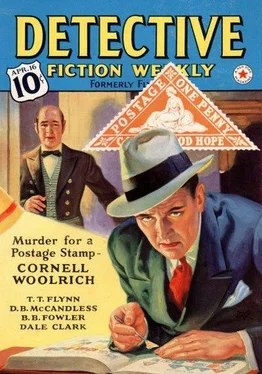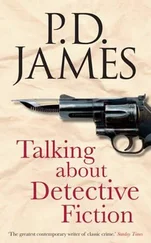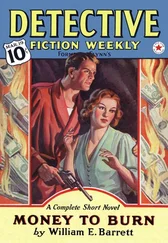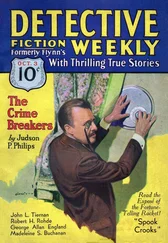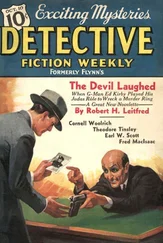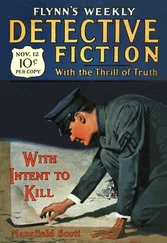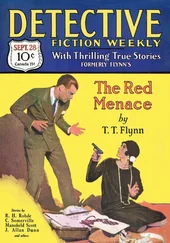Лоуренс Трит - Detective Fiction Weekly. Vol. 118, No. 6, April 16, 1938
Здесь есть возможность читать онлайн «Лоуренс Трит - Detective Fiction Weekly. Vol. 118, No. 6, April 16, 1938» весь текст электронной книги совершенно бесплатно (целиком полную версию без сокращений). В некоторых случаях можно слушать аудио, скачать через торрент в формате fb2 и присутствует краткое содержание. Город: New York, Год выпуска: 1938, Издательство: The Red Star News Company, Жанр: Детектив, на английском языке. Описание произведения, (предисловие) а так же отзывы посетителей доступны на портале библиотеки ЛибКат.
- Название:Detective Fiction Weekly. Vol. 118, No. 6, April 16, 1938
- Автор:
- Издательство:The Red Star News Company
- Жанр:
- Год:1938
- Город:New York
- ISBN:нет данных
- Рейтинг книги:3 / 5. Голосов: 1
-
Избранное:Добавить в избранное
- Отзывы:
-
Ваша оценка:
- 60
- 1
- 2
- 3
- 4
- 5
Detective Fiction Weekly. Vol. 118, No. 6, April 16, 1938: краткое содержание, описание и аннотация
Предлагаем к чтению аннотацию, описание, краткое содержание или предисловие (зависит от того, что написал сам автор книги «Detective Fiction Weekly. Vol. 118, No. 6, April 16, 1938»). Если вы не нашли необходимую информацию о книге — напишите в комментариях, мы постараемся отыскать её.
Detective Fiction Weekly. Vol. 118, No. 6, April 16, 1938 — читать онлайн бесплатно полную книгу (весь текст) целиком
Ниже представлен текст книги, разбитый по страницам. Система сохранения места последней прочитанной страницы, позволяет с удобством читать онлайн бесплатно книгу «Detective Fiction Weekly. Vol. 118, No. 6, April 16, 1938», без необходимости каждый раз заново искать на чём Вы остановились. Поставьте закладку, и сможете в любой момент перейти на страницу, на которой закончили чтение.
Интервал:
Закладка:
He had reached Canada, the country before Cape of Good Hope, when he finally quit for the night. The last thing he did before shutting the album was to turn two pages ahead and take another look at the famous Cape triangular. A long, lingering look. A tormented look.
“Are you real,” he breathed reverently, “or are you a phoney like mine?”
The only way to tell was by the watermark. The paper that blocks of stamps are printed on, before they are perforated and separated, is water-marked just like banknote or writing paper sometimes is. The watermark of the paper plays as important a part in the stamp’s description, in Scott’s catalogues and to collectors all over the world, as its color or design or face value. The authentic Cape triangulars, issued back in the Forties of the Nineteenth Century and now all gone from the world but three, were watermarked with the British royal crown and the initials V R, Victoria Regina. The fakes were unwatermarked, for this official postal paper could not be obtained, and that was the only sure way of telling them apart — as Hobart had found out to his cost. An unwary collector, in the heat of acquisition, seeing a prize he had never hoped to obtain within his reach and usually at a lower figure, was apt to overlook that — or had been ten or fifteen years ago, when knowledge and use of the watermark detector was not so widespread as now.
He was dying to know: had old Aaron Harding been stung just as he had, or was this the genuine article? Alongside that question, the preoccupation of these three ignoramuses as to who had killed him and why seemed trivial, unimportant, child’s play.
The old man had not owned a watermark detector; old-fashioned in that respect just as he had been about insurance and making a will. Hobart, as he moved the short distance from the table to the open room-door, made up his mind. He would bring his own over in his pocket tomorrow night when he came back to continue his auditing. If they left him alone in the room, off and on, the way they had tonight, he could easily take the stamp out of the album, test it in the detector, and replace it again without their being any the wiser. What harm could there possibly be in that? It was just to satisfy his own curiosity.
On the other hand, why do it secretively, behind these men’s backs? What harm would it have been to mention openly what he wanted to do, ask their permission? It almost certainly would have been granted him. Was it because he didn’t want to attract their attention to his overweening interest in it, put them on their guard against possible substitution? Was it because he already knew that he meant to do more than just test it?
He raised his voice and called from the doorway, “Foster! Inspector Foster! I’m going home now.”
“Find anything?” the detective called down from above-stairs.
“Not so far, but I’m going ahead with it tomorrow night.”
Foster came down personally to see him out.
Hobart said, “You’re not going to just leave those albums lying out there on the table all night, are you?” They couldn’t get it into their thick heads that those scraps of paper were worth all kinds of money! “Didn’t he keep them in a safe or anything?”
“No, just inside the drawers of that secretary, from what the Negroes tell me. I’ll put them back and keep the key on me. But they’re safe enough. There’ll be a cop at the door all night, anyway.” His attitude was plainly, “What burglar would be fool enough to go after those things, when there’s real loot in a house?” He began to thank Hobart warmly for his assistance, as he accompanied him to the door.
“Sorry I haven’t been able to turn up anything definite for you yet,” the expert said, “but I may come upon it further along in the collection.” The remark had an insincere ring, to his own ears, though. Because he knew he wasn’t really interested in whether he did or not. He was only interested in having an excuse to come back the next night and find out for sure whether or not that was a genuine Cape triangular.
IV
Business was slow the next day. There wasn’t much trading. Well, he’d made enough money. It wasn’t a matter of bread and butter any more. And that was when your sparetime hobby started to grow on you, crowd aside your full-time occupation. He’d noticed long ago that he couldn’t get as much thrill out of a transaction that meant a sizable profit as he could out of getting hold of some philatelic rarity that completed a certain set or filled the last blank space on a certain page. It was unreasonable, but there it was.
He found himself thinking of that Cape triangular time and again, even when he was watching the ticker. Was the stamp real or wasn’t it? And if it was, what good was it to a dead man?
He didn’t start right over to Harding’s house when he had finished his dinner that evening. He unlocked his den instead and went in to take out his own collection. It was while he was turning the dial on the wall safe that he happened to glance up into a mirror and see his manservant standing in the open doorway, looking in questioningly.
He whirled angrily, strode over to the door. “Don’t come in here,” he said sharply, “You know I don’t let anyone in here.”
“Sorry, sir. I knocked but you didn’t hear me. Inspector Foster just called again, sir. He said if you hadn’t left yet to finish going over Mr. Harding’s collection, to tell you he was on his way there, himself and he’d stop by and call for you, if you’d care to wait for him.”
This was unimportant from Hobart’s point of view. He certainly had no reason for not wanting to ride out with the detective. In fact it saved him the trouble of getting his own car out of the garage. It was important only in that it gave the servant his first inkling as to what the police-auxiliary business was his employer was engaged in over there.
Hobart closed the door in his face abruptly. The man’s face, as the shadow fell athwart it, became a study in homicidal rage. (It takes a fine point of psychology to explain this fully.) Apart from the fact that all household servants resent undue precautions guarding against theft taken by their employers, as a reflection on their characters, there was this added factor: this man of Hobart’s was fully aware that nothing of any value outside the stamps was kept in that den. Since these stamps meant absolutely nothing to him, were perfectly worthless in his eyes, it only aggravated him the more to have them guarded from him so pointedly. It was adding insult to injury. He could have understood it if it had been silverware, but to do it about something that in his estimation belonged in the dust-bin...
And finally, it so happened that he was rigidly honest, had never stolen a pin in his life, but was of a sulky, vicious disposition, inclined to brood over his grievances, whether real or imaginary, until they festered and became maniacal hales.
Hobart opened his album, looked at his own Cape triangular. He’d often wondered why, after he’d found out definitely it was spurious, he’d bothered keeping it in his collection, why he hadn’t thrown it away and marked it off to experience. In the beg inning, when he’d gone to the police about it (that was in New York) and they’d been trying to apprehend the swindler, he’d needed it of course for evidence. And then after that, when it became evident that the sharper had made good his escape, well, maybe the fact that Hobart had parted with five thousand dollars for it had something to do with his hanging onto it, just like people hang onto gold-brick stock they’ve been swindled into buying, even when they know it’s not worth the paper it’s printed on.
He removed the stamp now, with his tweezers. Then he brought out his watermark detector. This was simply a shallow little tray, about four by six inches, of a hard black bakelite composition. He placed the stamp in it, face down, so that the white reverse showed uppermost. Then he poured a few drops of benzine over it, enough to moisten the bottom of the tray. It wasn’t necessary to use this liquid; the same effect could be achieved with plain water, but benzine dries more rapidly. The soaked paper still showed completely unshadowed against the tray’s blackness, for this one was unwatermarked, a forgery.
Читать дальшеИнтервал:
Закладка:
Похожие книги на «Detective Fiction Weekly. Vol. 118, No. 6, April 16, 1938»
Представляем Вашему вниманию похожие книги на «Detective Fiction Weekly. Vol. 118, No. 6, April 16, 1938» списком для выбора. Мы отобрали схожую по названию и смыслу литературу в надежде предоставить читателям больше вариантов отыскать новые, интересные, ещё непрочитанные произведения.
Обсуждение, отзывы о книге «Detective Fiction Weekly. Vol. 118, No. 6, April 16, 1938» и просто собственные мнения читателей. Оставьте ваши комментарии, напишите, что Вы думаете о произведении, его смысле или главных героях. Укажите что конкретно понравилось, а что нет, и почему Вы так считаете.
